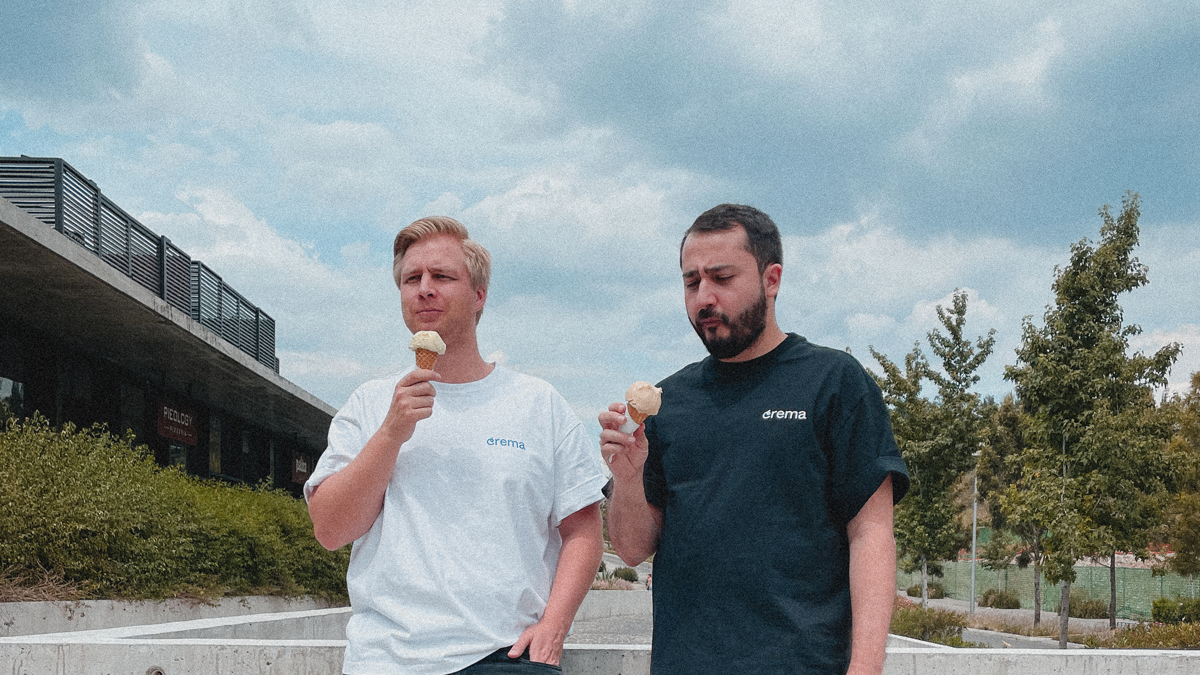Crema is a payment platform made 100% by freelancers for freelancers. The basis of its creation is due to the previous experience of the founders, Chris and Ramón. What went from being a friendship that grew in the offices of a company, ended in a synergy of ideas that would become what we now know as Crema.
With you, Chris and Ramón.
How did you two meet?
Ramón:
We met at our ex-job, a startup generator for corporations. Chris was already working there when I came in to take charge of Monterrey and to be the technology lead on the projects that were going to be developed there.
Chris:
We think there was a super quick match after we met in person. I remember very well that we introduced ourselves and "boom", Ramón started pitching some ideas for a project we were going to do in Monterrey. I liked him very much from then on; I think his first impression of me was different. I think he thought I was very “corporate bro” because of the way I dressed but, talking, I think I convinced him that I'm not really like that and I'm much more of the startup kind and he relaxed. I also think we both realized that we are the same in many ways. We were working on a project in Monterrey, we stayed the night, and he saw me working on something that wasn't it and, him being very gossipy, asked me what it was. I told him that I was putting together a startup (it wasn't Crema) and that I wanted to apply to Y Combinator with my idea - Y Combinator is the #1 startup accelerator in the world. Since then we have shared a dream of changing the world through technology. And already, we are in constant contact and, when either of us has an idea, we always make a call and talk about it to see how it could become a reality. That's exactly what happened with Crema; we've both been freelancing for a long time and one day for a wedding, Ramón was in CDMX, we got together for a few drinks and talked about everything. We also talked about freelancing and that there were a lot of problems for them (freelancers). For us it has always been the issue of getting paid on time or actually getting paid. When we talked about it more in depth it made more and more sense to try to find a solution so that freelancers didn't have to worry about whether they were going to get paid or not. And so, Crema was born.
What is your professional experience as freelancers?
Chris:
I've been freelancing for about 4 years now as an innovation consultant for SMEs here in Mexico. Ramón, on the other hand, is much more experienced as a freelancer; he has been doing it for 10 years, both part time and full time. I started freelancing helping my father-in-law with his family business. I think I did a good job because he recommended me to a friend of his, and so I built up my client portfolio. I've never been much of a freelance type of job seeker, but if an opportunity comes my way I always take it, if I'm interested in the project. What often happened to me was the issue of getting paid; it's super uncomfortable. Always asking for payment, for your money, especially money that you've already earned doing a job. Many times what happens is that you create friction between the two parties; because it's not only uncomfortable for you, it's uncomfortable for your client. And it's happened to me that I lose that client because I'm charging so often. And that sucks. What also happens is that they're not going to recommend you either and, as a freelancer, it's very important to be able to count on your clients’ recommendation. That's how you build your client base. But, fortunately, I've never been freelancing full time. It's always been like something in the evenings and free time, but I always wondered if I'd like to do it full time. And, I always came up with the same answer: "yes, but there are some tools missing for me to feel comfortable doing it". That's why we are doing Crema. We believe that the future is independent, that is going to happen, we don't know when but we know it’s for sure going to happen. The “blocker” there is today is that there are not enough tools for freelancers for people to feel comfortable to take the leap to do it full time. You're literally a one-person business and, unfortunately, there aren't that many options for you. All the tools are meant for businesses with teams. At Crema we want to support the ecosystem to build tools that help freelancers with their operations. We, at Crema, are starting with the problem of payments and collections as a freelancer. Hopefully more solutions will come that help freelancer operations in other ways. We are slowly enabling people to make the leap; people like me.
How did you use your individual expertise to make Crema?
Obviously for us it’s been super helpful to have the experience of being freelancers. If we hadn't had problems, Crema would never have been born. But, we saw the need, we literally lived it, and we are using that knowledge to build it. Fortunately, the two of us complement each other very well. Ramón is in charge of the technology and product side: his strength. And Chris takes care of the administrative, operational and growth issues.
Chris:
I think if you're going to build a startup, the best way to do it is with the team we have. If you add industry experience and intimate knowledge of the problem, you have something special, and that's what we have here. And, if you add to that a passion for helping freelancers, the community and contributing everything we can to create a much more robust and lively freelancer ecosystem, then you have Crema and its raison d'être.
We also think it's a good time to do something like Crema. More people are going freelance and living the charging problem; that's why we are there to help. Something that will always characterize Crema is its passion for the user. Always listening, always communicating and always using that feedback to improve the user experience. Fortunately for us and the whole team, we care a lot about the user and we've all been freelancers. We have all had the problem of getting paid and that motivates us to help everyone who uses Crema to reach out to help the millions of freelancers in Mexico, Latin America, and the world.
Tell us an anecdote that led you to think that something like Crema was necessary?
Every time we talk about what we are creating, it happens that a few people who have had the pain instantly understand what it is we are looking to solve. That "Aha!" moment is what keeps us on track and gave us the answer that we are doing the right thing.
At what point in your life would you have needed Crema?
For as long as we have been freelancing 100%. We are sure we would recover quite a bit of money from customers who never paid. Not to mention the money lost from clients who never came back for our services because we were so insistent. Also the aspect of time, effort and all the hassle we went through charging clients. So for the whole freelancer's life it would have been super useful to have a tool like Crema. And it's not just that; it's the aspect of not having to worry about whether or not you're going to get paid this month. We can't tell you how many times we've been waiting for them to pay us and they never do. It's an additional worry that you don't need as a freelancer. With Crema you take that away and you can live at least a little bit more worry free.
What are your wishes for people who use Crema?
That their freelance path is not so difficult and not so lonely. That they feel accompanied in the process of getting paid for the work they have worked so hard for.
Visit crema.cm for more information on how to start living the benefits of freelancing!


